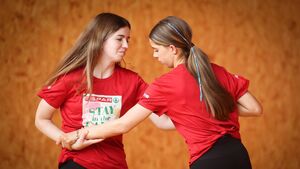Can Ireland make the Olympic dream last?

Sisters Rachel and Emma Rattigan from Aglish Boxing Club in Castlebar were at last Thursday's announcement that their club was one of five from across the country to win €2,000 as part of SPAR’s Stay in the Game campaign which is aimed at empowering teenage girls in sports and addressing the challenges they face in sustaining their participation. The duo got to meet two-time Olympic gold medallist boxer Kellie Harrington who is an ambassador of the campaign. Picture: INPHO/Tom Maher
When the Olympic Games last rolled into Los Angeles back in 1984, the Irish tourists returned with just a single piece of hardware for their efforts. But John Tracey’s performance under the blistering California sun to claim a silver medal in the men's marathon was viewed as a fairly solid haul for a country that wasn't overflowing with Olympic silverware at the time. Given Ireland wasn’t exactly a country known for its Olympic pedigree, it was a triumph to be savoured.
There was, nevertheless, a minor caveat. The Games had been boycotted by the Eastern Bloc which meant that the field was heavily depleted of the best talent in the world. The United States and other countries had boycotted the Games in Moscow four years earlier after the Soviet Union's invasion of Afghanistan so, amid the ongoing Cold War, it was only natural that the Soviet Union and their allies would return the favour once the event graced US soil.
Two of the men from the podium in Moscow, back-to-back Olympic gold medalist Waldemar Cierpinski and the then-reigning bronze medalist Satymkul Dzhumanazarov, didn't appear in the City of Angels for the first Summer Games hosted by the United States since the 1930s. And so Treacy seized the moment and secured a first medal for Ireland since 1964.
These were very different times for Irish sport on the global stage, when Irish athletes competed in hope rather than expectation. The country hadn’t won a gold medal since Ronnie Delany dashed to victory in Melbourne all the way back in 1956. Such glorious days were an anomaly.
But when the Irish delegation returns to the West Coast of the United States in four years' time, they will be carrying more than the weight of their bags. For recent success has come with the burden of expectation from a nation who have tasted success and are ravenous for more. There is a prevailing sense at the moment that Ireland has turned a corner as a sporting nation, that the paucity of global success has been resigned to the past, that it has emerged from the wilderness into a vast metropolis of opportunity and promise.
This past summer has only reinforced this belief as the beginning of another long Olympic cycle commences.
Ireland's recent medal haul in Paris – which saw the country take home four gold and three bronze medals – represented the nation’s best ever haul at the Games. It's the type of success that sets the foundations for an even more bountiful return when the Irish team embarks for California in 2028.
Setting high expectations is all well and good, but making such assumptions can also be a perilous path. It’s a double-edged sword.
Prior to this year's Olympics, the best ever performance by an Irish team was at the London Olympics in 2012 when the team returned home with six medals in total – one gold, one silver and four bronze. Expectations soared for the next four years ahead of the Games in Rio de Janeiro. Alas, the Irish didn't perform to the level that was expected of them. Instead of matching or surpassing the performances in London, the Irish delegation was marred by the Hogarthian scene of IOC President Pat Hickey being escorted from his hotel in a dressing gown during the middle of the night. That was the defining image of the Games from an Irish perspective.
The infamous ticket scandal became a perpetual motif throughout the entire Games, the fate of Hickey becoming a more fascinating story than any athletic performance. To add to Ireland's woes, athletes that went to the Games hoping to secure rare gold medals for Ireland such as Katie Taylor, Michael Conlan and Paddy Barnes didn't even make their respective podiums. The whole debacle provides a cautionary tale for those expecting Irish athletes to conquer all before them once again in Los Angeles.
In 2000, Sonia O’Sullivan's silver appeared to have set the foundations for a blossoming future. As was the case when Ronnie Delany raced to gold in Melbourne. As was the case when Pat O'Callaghan secured back-to-back gold medals when Los Angeles first hosted the quadrennial event. But history shows that uber-successful periods never transpired, as may have been envisioned.
It all serves as a reminder that unprecedented success doesn’t remove the onus which falls on sports administrators to harness any success to drive participation and interest levels. Fleeting glory can only be converted into lasting success through grit, persistence and a steady revenue stream. Politicians’ vocal support for Ireland's Olympians will only last as long as the goodwill of the nation continues to flow, but popular sports will gradually return from the summer recess and the Games will soon gradually become a fading memory until the promise of more medals sprouts into the public psyche again in 2028.
For all Ireland's recent success, there remains considerable ground to cover on the country that has been the Olympic standard-bearer for some time. With a population similar to Ireland's, New Zealand continued their immense record at the Olympics in Paris by bringing 20 medals back to the Antipodes, 10 of which were of the gold variety. While it is often pointed out that the strength of sports like GAA and rugby in Ireland stifles the development of Olympic disciplines, New Zealand’s consistent success across multiple disciplines has shown that even its rich rugby tradition doesn't hold back Olympic aspirations in that corner of the world. They're the true overachievers when it comes to the Olympics and set the standard for which every small nation strives.
Though Los Angeles seems like an eternity away for now, the challenge of building on Ireland's successes this summer has already started. The building blocks – unfettered passion, prodigious talent and resources – are all there for another record-breaking haul in 2028. But it's not a given.




